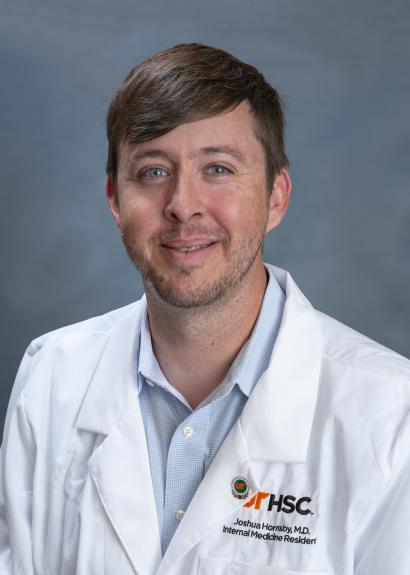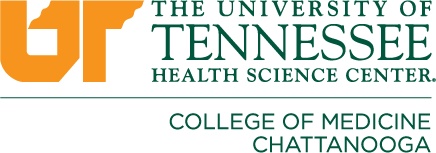Supervision and Procedures: Hornsby, Joshua (MD)
The Residency Supervision Area is designed to assist hospitals and clinics with the protocols outlined for specific duties residents and fellows can perform. These guidelines are determined by the faculty of the University of Tennessee College of Medicine Chattanooga, Internal Medicine Residency Medicine. Any questions about certain procedures not listed should be addressed to the faculty and not decided by the resident or fellow. A credentialed and privileged attending physician ultimately provides supervision or oversight of each Resident's patient care activities. Direct supervision by a qualified attending physician (or a more senior Resident with Indirect Supervision immediately available) is required in the OR/Delivery Room or for non-routine invasive procedures like Cardiac Cath, Endoscopy, and Interventional Radiology.
- Click here to view our UTCOMC GME Policy 400 Resident Supervision
- Click here to view the UTCOMC GME Policy 405 Patient Care Settings Resident Supervision Standards

Joshua Hornsby, MD
PGY-3 Resident
Internal Medicine
The Department of Medicine and its Internal Medicine Residency Program will ensure that all patient care is supervised by qualified faculty. Faculty schedules will be structured to provide residents with continuous supervision and consultation. Attending supervision should be adequate to provide quality patient care, and at times will require the daily examination and evaluation of the patient. At other times, this supervision may be accomplished by discussion during teaching rounds. A resident may request the physical presence of an attending at any time and is never to be refused. Attendings will be available for immediate consultation by pager/phone 24 hours a day.
Refer to the following definitions for physicians providing supervision:
- Attending of Record: Faculty member responsible for the service to which a patient is assigned.
- Supervising Physician: Attending or upper-level resident who is directly or indirectly supervising the patient care activities of interns.
In the Internal Medicine Residency Program, the chain of command should follow: -> upper level -> attending-> program director and division chief.
In an emergency, defined as a situation where immediate care is necessary to preserve life or prevent serious impairment, residents are permitted to initiate whatever care is necessary and reasonable to save a patient from serious harm even if an attending physician is not immediately available to supervise. The appropriate Medical Staff member should be notified as soon as possible.
Supervising physicians may be more advanced residents or fellows.
Refer to the following definitions for supervision which provides graduated authority and responsibility:
- Direct Supervision: Supervising physician is physically present with the resident and patient.
- Indirect Supervision (with direct supervision immediately available): Supervising physician is physically within the hospital or other site of patient care, and is immediately available to provide direct supervision.
- Indirect Supervision (with direct supervision available): Supervising physician is not physically present within the hospital or other site of patient care, but is immediately available by phone/text, and can be on site expediently to provide direct supervision if needed.
- Oversight: Supervising physician is available to provide review of procedures/encounters with feedback provided after care is delivered.
Duties that require a verbal discussion may be performed but should be discussed prior with the supervising physician, except in the case of an emergency. The supervising physician will then decide if the resident should perform this duty with indirect or direct supervision. The ultimate decision always rests with the attending of record or on-call attending physician.
| Certifications current when the resident entered training at the UTCOMC. |
| Basic Life Support (BLS) |
| Advanced Cardiac Life Support (ACLS) |
All Internal Medicine Residents (including interns) are required to be certified in Advanced Cardiac Life Support (ACLS), and should perform all procedures required regardless if the supervising physician is present in emergent situations.
Duties that require direct supervision are performed with the supervising physician present with the patient.
PGY-1 (INTERN) SUPERVISION REQUIREMENTS
|
Domain |
Indirect supervision with direct immediately available |
Direct Supervision |
|
Patient Care |
Evaluate unstable patients Perform a history and physical Order routine medications Order diagnostic tests |
Administration of anti-arrhythmics Make a DNR order Resuscitation from shock Transfer a patient to the ICU Ventilator management |
|
Procedures |
Intravenous line placement Nasogastric tube placement Pap smear and endocervical culture Urinary catheter placement Venous blood draw
|
Incision and drainage of abscess Arterial blood draw Arterial line placement Arthrocentesis Bone marrow biopsy Central venous line placement Endoscopy Endotracheal intubation Lumbar puncture Paracentesis Pulmonary artery catheter placement Thoracentesis |
When an intern is working, an upper-level resident or attending physician must be physically present in the same building.
Interns are expected to contact the supervising physician (either upper-level resident or attending) in the following circumstances:
- Significant change in patient condition:
- Transfer of the patient to the intensive care unit
- Need for intubation or ventilator support
- Cardiac arrest or significant changes in hemodynamic status
- Development of significant neurological changes
- Development of major wound complications
- Any significant clinical problem that will require an invasive procedure or operation
- Change in code status (upper level and attending should be notified)
- Patient death (expected or unexpected)
- Treatment error or complication
- New patient admission to the hospital or patient transfer from another facility
- Stable Patients: Interns should notify their supervisory physician at the earliest time convenient that does not interfere with his/her patient care duties.
- Unstable Patients: If after preliminary evaluation and assessment an unstable patient is identified, the supervising physician should be notified immediately (guideline of 5 minutes).
- Patient requesting to leave the hospital against medical advice (AMA)
- Patient or family request for a discussion with supervising physician
UPPER-LEVEL RESIDENT (PGY-2 AND PGY-3 LEVELS) SUPERVISION REQUIREMENTS
|
Domain |
Oversight |
Indirect supervision with direct available (verbal discussion) |
Direct supervision |
|
Patient Care |
Evaluate unstable patients Perform a history and physical Order medications Order diagnostic tests |
Administration of anti-arrhythmics Resuscitation from shock Ventilator management Make a DNR order |
|
|
Procedures |
Arterial blood draw Incision and drainage of abscess Intravenous line placement Nasogastric tube placement Pap smear/endocervical culture Urinary catheter placement Venous blood draw |
Arterial line placement Arthrocentesis Central venous line placement Lumbar puncture Paracentesis Thoracentesis |
Bone marrow biopsy Endoscopy Endotracheal intubation PA catheter placement
|
Upper-level residents should be available at all times to the intern on service and in their absence will assume all primary caregiver responsibilities. Upper-level residents are directly responsible to the attending of record, and should maintain open, continuous lines of communication regarding the status of the patients on the teaching team. On services with upper levels and fellows, residents are responsible to the fellow and attending on the service. As residents progress through upper-level months, increasing responsibility and autonomy are provided by the attending on service, such that by the final inpatient months of training, each resident should essentially be functioning as an attending with regards to medical decision-making.
In the setting of an intern being supervised by an upper level resident, it is expected that the supervising resident examine and evaluate each patient on the service at least daily.
The upper-level resident and intern should maintain clear communication about the patient’s care.
Upper-level residents are expected to contact the attending of record or on-call attending in the following circumstances:
- Significant change in patient condition:
- Transfer of the patient to the intensive care unit
- Need for intubation or ventilator support
- Cardiac arrest or significant changes in hemodynamic status
- Any significant clinical problem that will require an invasive procedure or operation
- Patient death (expected or unexpected)
- Treatment error or complication
- New patient admission to the hospital or patient transfer from another facility
- Stable Patients: Upper-level residents should contact the attending of record or on-call attending after their initial evaluation is complete and at the earliest time convenient that does not interfere with his/her patient care duties.
- Unstable Patients: If after evaluation and assessment an unstable patient is identified, the attending of record or on-call attending should be notified promptly (guideline of 15 minutes) by one of the team members, unless all team members are needed to stabilize the patient’s condition or coordinate transfer to the ICU. If such a delay is required than a call should be placed as soon as feasible.
- Patient requesting to leave the hospital against medical advice (AMA).
- Patient or family request for a discussion with supervising physician.
All ther procedures not identified above must be performed under direct supervision of a faculty member or more senior resident.


